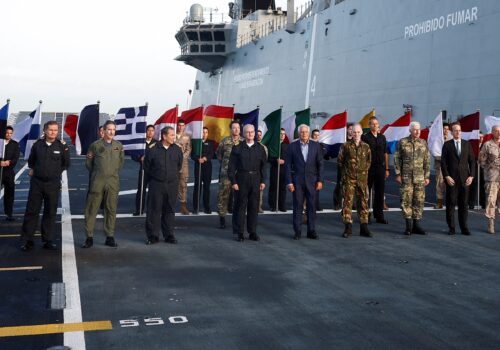Working on a new transatlantic approach toward the Western Balkans
This essay is part of the report “Transatlantic horizons: A collaborative US-EU policy agenda for 2025 and beyond,” which outlines an agenda for common action for the next US administration and European Commission.
The bottom line
The Western Balkans is a region neither the United States nor the European Union (EU) can afford to ignore or mishandle. Tensions are too high, and the geopolitical implications of misinformed and misaligned policy are costly. The United States and the EU must work together, and play to their own respective strengths, to prioritize democratic and economic growth and alignment with the West.
State of play
Visits to the Western Balkans elicit two contradictory feelings. On the one hand, the region is vibrant and brimming with potential. The World Bank projects the regional gross domestic product growth for the Western Balkans Six—Albania, Bosnia and Herzegovina, Kosovo, North Macedonia, Montenegro, and Serbia—to be 3.2 percent this year and 3.5 percent in 2025, noting some “cautious optimism.” On the other hand, too often the region is stuck in a disorganized and chaotic feedback loop, its violent histories seem inescapable, and its democratic culture remains lacking. Flashes of ethnic and political violence have risked upending the fragile peace between Serbia and Kosovo. Democracy ratings by international observers such as Freedom House are tracking democratic declines or stagnation in the region.
The United States and the EU have recognized the importance of the Western Balkans and have worked on engaging the region, to varying degrees of success. There has been modest progress on the region’s Euro-Atlantic integration, and there remains moderate to strong support inside the region for a European future. There has also been renewed momentum from the EU to make progress on enlargement to the region as Russia’s full-scale invasion of Ukraine has reinvigorated the bloc’s understanding of the geopolitics of enlargement.
Yet structural issues continue to frustrate the region’s Euro-Atlantic trajectory. The EU’s enlargement process, with single member state vetoes holding up progress, remains deeply flawed. At the same time, US policy toward the Western Balkans, particularly focusing on the normalization dialogue between Kosovo and Serbia, has not produced the desired results, as local politics and nationalisms have torpedoed the Association of Serb-Majority Municipalities. These opportunities and challenges together will require leadership from the United States and the EU to realize the region’s potential.
The strategic imperative
Geopolitics is the main driver of the external focus on the Western Balkans. The region for years has been Europe’s “soft underbelly,” where Russia holds significant influence as both an instigator and negotiator, especially in Serbia and Republika Srpska (the Serb-majority entity within Bosnia and Herzegovina) but also in North Macedonia, Montenegro, and Kosovo. Russia’s full-scale invasion of Ukraine has raised the stakes about Moscow’s willingness to inflame conflict in the region. Securing the region within the Euro-Atlantic framework will do much to stem Russia’s influence and diminish the chances of violence on the continent.
Another geopolitical driver is the role of China. Beijing has stepped up its involvement primarily through investments in major infrastructure projects and mines. The US House Foreign Affairs Committee estimates that China has invested around $1 billion in the region annually since 2011, and approximately $10.3 billion in Serbia alone from 2009–2021. Five of the Western Balkans Six are members of China’s Belt and Road Initiative, and Serbia’s security cooperation with Beijing has grown to encompass overseas “police stations,” surveillance and facial recognition camera installations, and joint military exercises.
There are positive motivators for transatlantic engagement, too. The region could be a success story for the West’s de-risking agenda. Lower labor costs and the region’s strategic geographic location and physical proximity offer a twofold opportunity to help realize Europe’s—and the United States’—efforts to reshore its supply chains and investments and diminish China’s own influence.
Both the United States and the EU need a clear vision for the region. With the right strategy, the region can overcome its challenges and emerge as a stable, prosperous, and democratic part of Europe. By prioritizing democratic values and good governance, economic revitalization, and strategic partnerships, the United States and the EU can significantly and positively impact the region’s trajectory. Ultimately, a successful transatlantic policy in the Western Balkans requires a long-term commitment, sustained engagement, and a clear vision for the region’s future.
Looking ahead
The Western Balkans will remain a focus on both sides of the Atlantic. Either a Democratic or Republican administration is expected to be more engaged once in office than during this past election year and will bring a focus on security issues, economic development, and regional integration, as well as on the rule of law, the fight against endemic corruption, and democracy. In Europe, too, the European Commission will focus on the region, including on enlargement, economic growth, and the rule of law.
Of crucial importance is how the new administrations will implement their policies in the region. Many of the key topics and priorities have already been identified. For example, Serbia will likely be the main focus of the next US administration due to its relatively large size, economic development, and the deteriorating state of its democracy, rule of law, and media freedom—not to mention its geopolitical role as a willing partner to both Moscow and Beijing. The European Commission’s Growth Plan for the Western Balkans will also continue to be a centerpiece of transatlantic priorities for the region.
The uncertainties are prioritization and calibration. How will policymakers prioritize the need to address economic or democratic reforms? Will the United States continue its practice of giving the lead to the EU, which all countries in the region at least nominally aspire to join?
The prioritization of democratic values will be the key to engaging the region successfully in the future. A more decisive and uncompromising insistence on the development of democratic institutions and values—such as free and fair elections, the rule of law, and the fight against corruption and organized crime—must be a priority. Reforms in these areas are prerequisites for any sustainable economic progress and investment, and stronger democratic consolidation will do far more to reduce the impact of malign influences from Russia and China that thrive precisely in the absence of these values. Failing to prioritize democracy in the region will risk cementing the petrifying status quo.
Whatever happens in November, a much stronger and more active US role in the Western Balkans will be required. Previously, the United States has given primacy to the EU, but that strategy has not yielded convincing and sustainable results on key issues like the struggles of the Belgrade-Pristina dialogue (and the lack of implementation of the Brussels and Ohrid agreements that underpin it), and the festering ethnic tensions in Bosnia and Herzegovina. This is a consequential demonstration of the EU’s inability to take a leading role and bring key players to the table with the determination to reach an agreement. As a result, the process of normalization between Kosovo and Serbia has stalled—or worse, deteriorated.
The EU is an important and powerful bloc, but its institutional structure has limited its effectiveness. The bloc is a heterogeneous and loose union of twenty-seven members, many with vastly different priorities for the region. While still immensely influential, it is not decisive in some key policy areas, especially enlargement, where the current veto system has left the Western Balkans as a political punching bag for domestic politics among EU member states. A few such cases include Bulgaria and Greece blocking North Macedonia’s progress, Slovenia delaying Croatia’s 2013 accession over border disputes, and traditional enlargement skepticism in France and the Netherlands stemming from, among other considerations, domestic political concerns about, for example, immigration. Given that this decision-making framework is embedded in the highest legal act of the EU, it is not realistic to expect any change in the foreseeable future—even though change is much needed.
The United States is not as constrained in implementing its policy toward the Western Balkans. Provided the next administration does not change its priorities for the Western Balkans, it would be of crucial importance to take a more decisive stance in pursuing its interests, especially when it comes to security, the fight against corruption, the rule of law, media freedom, and the reduction of Russian and Chinese influence. All of these goals are achievable, but only if the next administration acts energetically and resolutely in their implementation.
Policy recommendations
There is much that the United States and the EU can do—together and separately—to enact positive change in the Western Balkans. Recommendations include:
Insist on the primacy of democracy and the rule of law. The underpinning of democracy should be a prerequisite of any approach to the region. The United States and the EU, therefore, must prioritize support for democratic reforms, anti-corruption efforts, and the rule of law in the Western Balkans, specifically through:
- Anti-corruption measures: Corruption is a pervasive problem in the region. US and EU policymakers should provide technical assistance to develop and implement effective anti-corruption strategies, including strengthening law enforcement, improving transparency, and protecting whistleblowers.
- Judicial reform: Independent and impartial judiciaries are crucial for upholding the rule of law. Plans for the region should include the provision of training for judges and prosecutors and promoting the independence of the judiciary.
- The empowerment of civil society: An independent and vocal civil society is essential for holding governments to account. The United States and the EU should support civil society organizations, particularly those working on good governance, human rights, and anti-corruption initiatives.
Scale up economic engagement. The Western Balkans region possesses untapped economic potential. The United States and the EU must significantly expand and see through economic engagement in the region. Building on the foundation set by the Western Balkans Democracy and Prosperity Act, a bill introduced by US Sens. Jeanne Shaheen (D-NH) and Roger Wicker (R-MS), policymakers should aggressively pursue a strategy of investment, trade facilitation, and infrastructure development in the region by:
- Doubling down on investment: Policymakers should double down on investments in the region, focusing on sectors with high growth potential, such as renewable energy, technology, and agriculture. Leveraging public-private partnerships will be key to attracting private capital and creating jobs. Investments should be coordinated or at least deconflicted between Washington and Brussels.
- Streamlining trade: Facilitating trade, particularly between the United States and the Western Balkans, is an important signal of the West’s involvement in the region. Reducing trade barriers, simplifying customs procedures, and providing technical assistance on EU standards alignment will help boost exports and attract foreign investment.
- Driving infrastructure development: Investing in infrastructure such as transportation, energy, and digital connectivity will help economic growth, regional integration, and the green transition. The United States can partner with the EU (and international financial institutions) to finance large-scale projects. This would be particularly welcome to counter Chinese infrastructure investments in the region.
Refocus on regional economic competitiveness. Increasing the Western Balkans’ competitiveness will make Europe more competitive. To accomplish this, a joint effort is needed to improve the business environment, foster innovation, and develop a skilled workforce, including by:
- Improving the business climate: The United States and the EU should provide technical assistance to reform regulatory frameworks and improve governance with the goal of reducing bureaucratic hurdles, enforcing property rights, and combating corruption—all of which are essential for attracting foreign investment.
- Fostering innovation: Supporting research and development, technology transfers, and entrepreneurship can help drive innovation and create new opportunities. Establishing innovation hubs and incubators can help nurture a culture of entrepreneurship.
- Investing in human capital: A skilled workforce is essential for economic growth. The United States and the EU can support education and vocational training programs, particularly for young people. Instead of looking to emigrate elsewhere, the region’s youth can find incentives to stay.
Develop a new approach to the Serbia-Kosovo dialogue. The Serbia-Kosovo dialogue has been a longstanding and complex issue. It needs new life with incoming US and EU administrations. The United States, specifically, should play a more active role in facilitating a comprehensive and final normalization agreement. Recommendations include:
- Introduce joint US-EU leadership: The United States and the EU should jointly lead the dialogue, leveraging their combined diplomatic weight and expertise.
- Focus on normalization: The dialogue should prioritize practical steps toward normalization of relations, including economic cooperation, freedom of movement, and mutual recognition.
- Develop conditional incentives: Economic incentives can be used to encourage progress in the dialogue, but they should be conditioned on concrete achievements. The EU’s Growth Plan can be a crucial mechanism to promote progress and discourage stagnation, or worse—cooperation with malign actors.
- Addressing the root causes: The underlying issues of the conflict, such as minority rights and safeguarding territorial integrity, must be addressed to achieve a lasting peace.
Develop policy for cybersecurity and infrastructure protection. The Western Balkans is increasingly vulnerable to cyber threats, as have been documented recently in Albania, Montenegro, and North Macedonia. Protecting critical infrastructure and building cybersecurity capacity are essential for economic growth and regional stability.
- Cybersecurity capacity building: The United States and the EU should support the development of cybersecurity capabilities in the region through training, capacity building, and technology transfers.
- Critical infrastructure protection: Partnering with the private sector, the United States and the EU can help protect critical infrastructure, such as energy, transportation, and telecommunications, from cyberattacks.
- Countering disinformation: The spread of disinformation and foreign interference is a growing challenge. The United States and the EU have successfully supported media literacy programs and fact-checking to counter these threats, but more can be done at the local level in cities outside the capitals.
Refocus on countering malign influence. The Western Balkans remains a geopolitical battleground, with Russia and China seeking to increase their influence in the region. The United States and the EU should develop strategies to counter these efforts. Such a strategy should include:
- Strategic competition: The United States should adopt a competitive approach to Russia and China, offering alternative partnerships, investments, and security cooperation.
- Energy security: Reducing the region’s dependence on Russian energy is crucial. The United States can support diversification of energy sources and infrastructure development.
- Information warfare: Countering disinformation campaigns and strengthening media literacy are essential to protect the region from foreign manipulation.
- Strengthening NATO: Reinforcing NATO’s presence in the region is crucial to deter aggression and reassure allies. Eventually, moving Kosovo closer to NATO membership will be an important step toward regional stability.
Maja Piscevic is a nonresident senior fellow with the Atlantic Council’s Europe Center and representative of the center in the Western Balkans.
Ilva Tare is a resident senior fellow at the Atlantic Council’s Europe Center and host of the #BalkansDebrief podcast.
read more essays

The Europe Center promotes leadership, strategies, and analysis to ensure a strong, ambitious, and forward-looking transatlantic relationship.
Image: An attendee walks at the venue on the day of the EU-Western Balkans summit in Tirana, Albania, February 29, 2024. REUTERS/Florion Goga.


